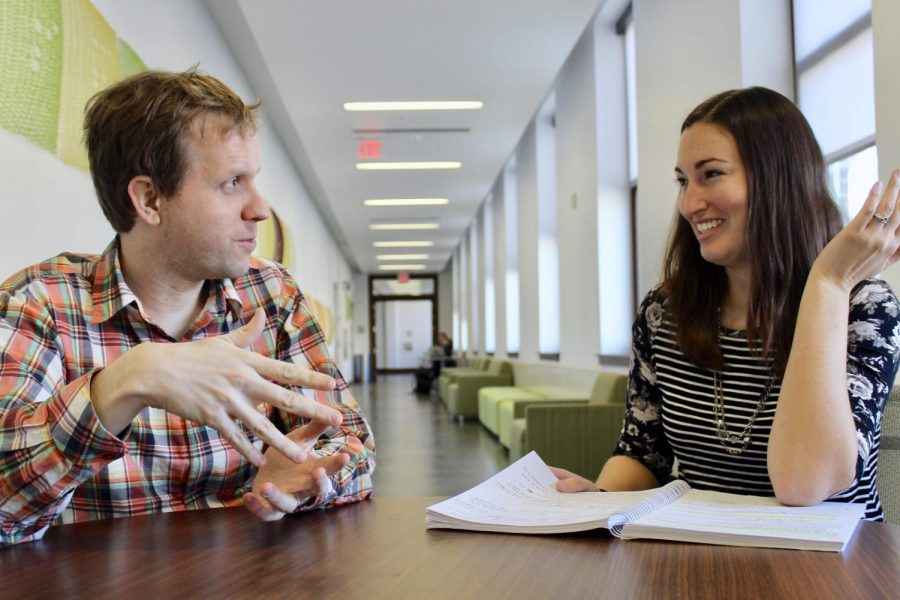University pilots new data science course
Wade Fagen-Ulmschneider and Karle Flanagan, who will be teaching a new course called STAT 107 Data Science Discovery, sit at a table in Lincoln Hall on Wednesday, Nov. 28.
Nov 28, 2018
The gap between data science and computer programming is becoming even smaller. At the University, a new introductory course is being developed to encourage beginners to take an interest in these fields.
The pilot launch for a new data science course, STAT 107: Data Science Discovery, is set to take place in the Spring 2019 semester. It will be co-taught by statistics instructor, Karle Flanagan, and computer science teaching assistant professor, Wade Fagen-Ulmschneider.
A class of 30 students from 30 different majors, ranging from political science to theater lighting design, will be the first group to test the course.
“We want everyone to know that the course is designed for anyone,” Flanagan said. “Even though there’s programming, you don’t have to have any background knowledge. So we figured for the pilot, what better way to test it out than a bunch of different majors.”
From there, it will be offered for all students in the fall pending approval as a general education course that fulfills the quantitative reasoning requirement.
Get The Daily Illini in your inbox!
The course is project driven, with much of the grade made up of three projects.
“The students can pick datasets that matter to them,” Flanagan said. “That will be the cool thing with 30 different majors is we’ll get to see from a lens from all these different people what they can do with data.”
STAT 107 is the first data science course at the University offered to undergraduate students without any prior experience.
The course will cover topics similar to those in STAT 100: Statistics, but with the element of computer science added.
“Topics we learn in STAT 100 will be a more conceptual overview,” Flanagan said. “Rather than doing calculations by hand, students will learn how to code in Python.”
Fagen-Ulmschneider said he doesn’t want the programming in this course to be “scary.”
“We see Python as a tool like using Excel,” Fagen-Ulmschneider said. “Excel can do a million different things, but you know how to use Excel to get what you need done. We are going to give you a little bit of this tool so you’re not overwhelmed by all the syntax and crazy stuff that CS majors go through.”
While pilots for new courses are not required, with a potential class size of 600 students in the fall, both Flanagan and Fagen-Ulmschneider agreed the pilot section will be essential to the success of the course in the long-run.
“One thing about teaching large classes well is they have to be organized,” Fagen-Ulmschneider said. “There are so many things that we’re relying on. We knew that if we did this with 600 students, having never done this before, it would be a disaster.”
With two instructors co-teaching the course, it will be a unique collaborative experience.
“The way I think of things coming from an engineering background makes sense in my head, but Karle will explain it in a different way that will make sense to another subset of people,” Fagen-Ulmschneider said.
This course is the beginning of the University’s effort to make data science more prominent throughout campus beyond the statistics department.
“We have been talking to a bunch of different departments on campus, telling them about our course and that they should build a data science course specific to your specialty, that has this course as a prerequisite,” Flanagan said. “We are going to call these connector courses, and its already in the works for a couple different departments.”
Tina Abraham, senior in LAS, will be a course aide in the pilot run. She said this course will provide a starting point for students who are interested in data science and that the basic knowledge will be beneficial for all majors.
“Data science is one of the hottest topics in the market right now,” Abraham said. “Learning even the foundational aspects of it can put you ahead of many competitive candidates. Data isn’t going anywhere, so might as well learn how to make the most out of it.”
Fagen-Ulmschneider said he thinks data science will be an essential part of the curriculum in the coming years.
“I personally think that the literacy of the 21st century is going to be able to do meaningful things with data,” Fagen-Ulmschneider said. “So I think what we are starting right now will be something that you look back on in 10 years and think, ‘Yeah, everyone needs to know data science, almost like math and reading.’ And that’s the foundation we are setting.”






